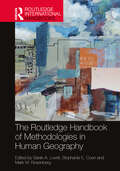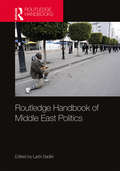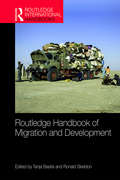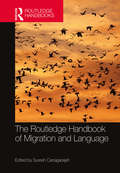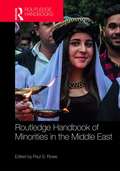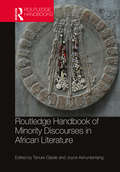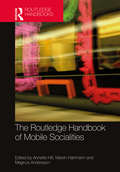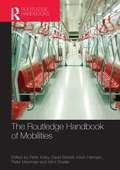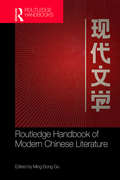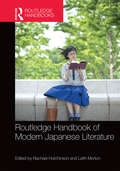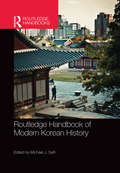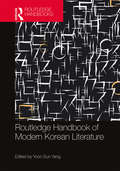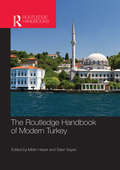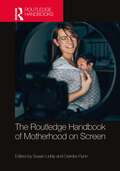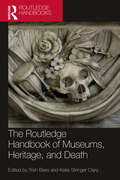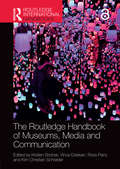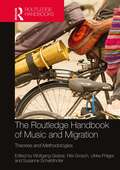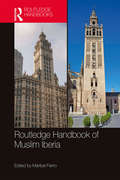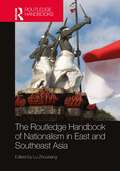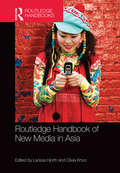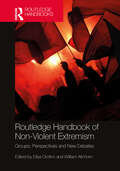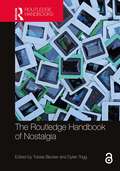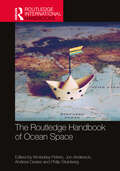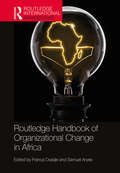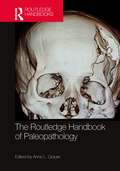- Table View
- List View
The Routledge Handbook of Methodologies in Human Geography (Routledge International Handbooks)
by Sarah A. Lovell Stephanie E. Coen Mark W. RosenbergThe Routledge Handbook of Methodologies in Human Geography is the defining reference for academics and postgraduate students seeking an advanced understanding of the debates, methodological developments and methods transforming research in human geography. Divided into three sections, Part I reviews how the methods of contemporary human geography reflect the changing intellectual history of human geography and events both within human geography and society in general. In Part II, authors critically appraise key methodological and theoretical challenges and opportunities that are shaping contemporary research in various parts of human geography. Contemporary directions within the discipline are elaborated on by established and emerging researchers who are leading ontological debates and the adoption of innovative methods in geographic research. In Part III, authors explore cross-cutting methodological challenges and prompt questions about the values and goals underpinning geographical research work, such as: Who are we engaging in our research? Who is our research ‘for’? What are our relationships with communities? Contributors emphasize examples from their research and the research of others to reflect the fluid, emotional and pragmatic realities of research. This handbook captures key methodological developments and disciplinary influences emerging from the various sub-disciplines of human geography.
Routledge Handbook of Middle East Politics
by Larbi SadikiDrawing on various perspectives and analysis, the Handbook problematizes Middle East politics through an interdisciplinary prism, seeking a melioristic account of the field. Thematically organized, the chapters address political, social, and historical questions by showcasing both theoretical and empirical insights, all of which are represented in a style that ease readers into sophisticated induction in the Middle East. It positions the didactic at the centre of inquiry. Contributions by forty-four scholars, both veterans and newcomers, rethink knowledge frames, conceptual categories, and fieldwork praxis. Substantive themes include secularity and religion, gender, democracy, authoritarianism, and new "borderline" politics of the Middle East. Like any field of knowledge, the Middle East is constituted by texts, authors, and readers, but also by the cultural, spatial, and temporal contexts within which diverse intellectual inflections help construct (write–speak) academic meaning, knowing, and practice. By denaturalizing notions of singularity of authorship or scholarship, the Handbook plants a dialogic interplay animated by multi-vocality, multi-modality, and multi-disciplinarity. Targeting graduate students and young scholars of political and social sciences, the Handbook is significant for understanding how the Middle East is written and re-written, read and re-read (epistemology, methodology), and for how it comes to exist (ontology).
Routledge Handbook of Migration and Development (Routledge International Handbooks)
by Tanja Bastia Ronald SkeldonThe Routledge Handbook of Migration and Development provides an interdisciplinary, agenda-setting survey of the fields of migration and development, bringing together over 60 expert contributors from around the world to chart current and future trends in research on this topic. The links between migration and development can be traced back to the post-war period, if not further, yet it is only in the last 20 years that the 'migration–development nexus' has risen to prominence for academics and policymakers. Starting by mapping the different theoretical approaches to migration and development, this book goes on to present cutting edge research in poverty and inequality, displacement, climate change, health, family, social policy, interventions, and the key challenges surrounding migration and development. While much of the migration literature continues to be dominated by US and British perspectives, this volume includes original contributions from most regions of the world to offer alternative non-Anglophone perspectives. Given the increasing importance of migration in both international development and current affairs, the Routledge Handbook of Migration and Development will be of interest both to policymakers and to students and researchers of geography, development studies, political science, sociology, demography, and development economics.
The Routledge Handbook of Migration and Language (Routledge Handbooks in Applied Linguistics)
by Suresh Canagarajah** Winner of AAAL Book Award 2020 ** **Shortlisted for the BAAL Book Prize 2018** The Routledge Handbook of Migration and Language is the first comprehensive survey of this area, exploring language and human mobility in today’s globalised world. This key reference brings together a range of interdisciplinary and multidisciplinary perspectives, drawing on subjects such as migration studies, geography, philosophy, sociology and anthropology. Featuring over 30 chapters written by leading experts from around the world, this book: Examines how basic constructs such as community, place, language, diversity, identity, nation-state, and social stratification are being retheorized in the context of human mobility; Analyses the impact of the ‘mobility turn’ on language use, including the parallel ‘multilingual turn’ and translanguaging; Discusses the migration of skilled and unskilled workers, different forms of displacement, and new superdiverse and diaspora communities; Explores new research orientations and methodologies, such as mobile and participatory research, multi-sited ethnography, and the mixing of research methods; Investigates the place of language in citizenship, educational policies, employment and social services. The Routledge Handbook of Migration and Language is essential reading for those with an interest in migration studies, language policy, sociolinguistic research and development studies.
Routledge Handbook of Minorities in the Middle East
by Paul S RoweThe Routledge Handbook of Minorities in the Middle East gathers a diverse team of international scholars, each of whom provides unique expertise into the status and prospects of minority populations in the region. The dramatic events of the past decade, from the Arab Spring protests to the rise of the Islamic state, have brought the status of these populations onto centre stage. The overturn of various long-term autocratic governments in states such as Tunisia, Egypt, Libya, and Yemen, and the ongoing threat to government stability in Syria, Iraq, and Lebanon have all contributed to a new assertion of majoritarian politics amid demands for democratization and regime change. In the midst of the dramatic changes and latent armed conflict, minority populations have been targeted, marginalized, and victimized. Calls for social and political change have led many to contemplate the ways in which citizenship and governance may be changed to accommodate minorities – or indeed if such change is possible. At a time when the survival of minority populations and the utility of the label minority has been challenged, this handbook answers the following set of research questions.What are the unique challenges of minority populations in the Middle East? How do minority populations integrate into their host societies, both as a function of their own internal choices, and as a response to majoritarian consensus on their status? Finally, given their inherent challenges, and the vast, sweeping changes that have taken place in the region over the past decade, what is the future of these minority populations? What impact have minority populations had on their societies, and to what extent will they remain prominent actors in their respective settings? This handbook presents leading-edge research on a wide variety of religious, ethnic, and other minority populations. By reclaiming the notion of minorities in Middle Eastern settings, we seek to highlight the agency of minority communities in defining their past, present, and future.
Routledge Handbook of Minority Discourses in African Literature
by Tanure Ojaide Joyce AshuntantangThis handbook provides a critical overview of literature dealing with groups of people or regions that suffer marginalization within Africa. The contributors examine a multiplicity of minority discourses expressed in African literature, including those who are culturally, socially, politically, religiously, economically, and sexually marginalized in literary and artistic creations. Chapters and sections of the book are structured to identify major areas of minority articulation of their condition and strategies deployed against the repression, persecution, oppression, suppression, domination, and tyranny of the majority or dominant group. Bringing together diverse perspectives to give a holistic representation of the African reality, this handbook is an important read for scholars and students of comparative and postcolonial literature and African studies.
The Routledge Handbook of Mobile Socialities
by Annette Hill; Maren Hartmann; Magnus AnderssonThis is a state-of-the-art survey of an emerging area of study in media, communication and cultural studies, mobility studies and mobile communications. ‘Mobile socialities’ demarcates a new area of research that captures people’s various and contrary experiences of media in relation to their mobilities and socialities. The chapters in this volume are written by a range of international scholars offering a comprehensive overview and source of inspiration for a diverse range of topics on the contingent practices and finite resources of people and media on the move. The book demonstrates through empirical and theoretical research how mobile socialities is a generative concept for thinking through power, identity and the contexts of media in public and mediated spaces, work and everyday life, addressing a spectrum of mobile socialities and lived politics. The research and various cases make visible previously hidden, or obscured, social practices and allow us to rethink the meanings of mobility, digital media or the home in these examples of people living within the centre and peripheries of society. The Handbook establishes mobile socialities as a new area of academic enquiry, ideal for advanced undergraduate students and scholars across the disciplines of media, communication and cultural studies, anthropology, cultural geography and sociology.
The Routledge Handbook of Mobilities
by Kevin Hannam Mimi Sheller Peter Merriman Peter Adey David BissellThe 21st century seems to be on the move, perhaps even more so than the last. With cheap travel, and more than two billion cars projected worldwide for 2030. And yet, all this mobility is happening incredibly unevenly, at different paces and intensities, with varying impacts and consequences to the extent that life on the move might be actually quite difficult to sustain environmentally, socially and ethically. As a result 'mobility' has become a keyword of the social sciences; delineating a new domain of concepts, approaches, methodologies and techniques which seek to understand the character and quality of these trends. This Handbook explores and critically evaluates the debates, approaches, controversies and methodologies, inherent to this rapidly expanding discipline. It brings together leading specialists from range of backgrounds and geographical regions to provide an authoritative and comprehensive overview of this field, conveying cutting edge research in an accessible way whilst giving detailed grounding in the evolution of past debates on mobilities. It illustrates disciplinary trends and pathways, from migration studies and transport history to communications research, featuring methodological innovations and developments and conceptual histories - from feminist theory to tourist studies. It explores the dominant figures of mobility, from children to soldiers and the mobility impaired; the disparate materialities of mobility such as flows of water and waste to the vectors of viruses; key infrastructures such as logistics systems to the informal services of megacity slums, and the important mobility events around which our world turns; from going on vacation to the commute, to the catastrophic disruption of mobility systems. The text is forward-thinking, projecting the future of mobilities as they might be lived, transformed and studied, and possibly, brought to an end. International in focus, the book transcends disciplinary and national boundaries to explore mobilities as they are understood from different perspectives, different fields, countries and standpoints. This is an invaluable resource for all those with an interest in mobility across disciplinary boundaries and areas of study.
Routledge Handbook of Modern Chinese Literature
by Ming Dong GuThe Routledge Handbook of Modern Chinese Literature presents a comprehensive overview of Chinese literature from the 1910s to the present day. Featuring detailed studies of selected masterpieces, it adopts a thematic-comparative approach. By developing an innovative conceptual framework predicated on a new theory of periodization, it thus situates Chinese literature in the context of world literature, and the forces of globalization. Each section consists of a series of contributions examining the major literary genres, including fiction, poetry, essay drama and film. Offering an exciting account of the century-long process of literary modernization in China, the handbook’s themes include: Modernization of people and writing Realism, rmanticism and mdernist asthetics Chinese literature on the stage and screen Patriotism, war and revolution Feminism, liberalism and socialism Literature of reform, reflection and experimentation Literature of Taiwan, Hong Kong and new media This handbook provides an integration of biographical narrative with textual analysis, maintaining a subtle balance between comprehensive overview and in-depth examination. As such, it is an essential reference guide for all students and scholars of Chinese literature.
Routledge Handbook of Modern Japanese Literature
by Rachael Hutchinson and Leith MortonThe Routledge Handbook of Modern Japanese Literature provides a comprehensive overview of how we study Japanese literature today. Rather than taking a purely chronological approach to the content, the chapters survey the state of the field through a number of pressing issues and themes, examining the ways in which it is possible to read modern Japanese literature and situate it in relation to critical theory. The Handbook examines various modes of literary production (such as fiction, poetry, and critical essays) as distinct forms of expression that nonetheless are closely interrelated. Attention is drawn to the idea of the bunjin as a ‘person of letters’ and a more realistic assessment is provided of how writers have engaged with ideas – not labelled a ‘novelist’ or ‘poet’, but a ‘writer’ who may at one time or another choose to write in various forms. The book provides an overview of major authors and genres by situating them within broader themes that have defined the way writers have produced literature in modern Japan, as well as how those works have been read and understood by different readers in different time periods. The Routledge Handbook of Modern Japanese Literature draws from an international array of established experts in the field as well as promising young researchers. It represents a wide variety of critical approaches, giving the study a broad range of perspectives. This handbook will be of interest to students and scholars of Asian Studies, Literature, Sociology, Critical Theory, and History.
Routledge Handbook of Modern Korean History
by Michael J SethBeginning in the mid-nineteenth century when Korea became entangled in the world of modern imperialism and the old social, economic and political order began to change; this handbook brings together cutting edge scholarship on major themes in Korean History. Contributions by experts in the field cover the Late Choson and Colonial periods, Korea’s partition and the diverging paths of North and South Korea. Topics covered include: The division of Korea Religion Competing imperialisms Economic change War and rebellions Nationalism Gender North Korea Under Kim Jong Il Global Korea The Handbook provides a stimulating introduction to the most important themes within the subject area, and is an invaluable reference work for any student and researcher of Korean History.
Routledge Handbook of Modern Korean Literature
by Yoon Sun YangThe Routledge Handbook of Modern Korean Literature provides a comprehensive overview of a Korean literary tradition, which is understood as a multifaceted nexus of practices, both homegrown and transnational. The handbook discusses the perspectives from which modern Korean literature has thus far been defined, analyzing which voices have been enunciated, underappreciated, or completely silenced and how we can enrich our understanding of it. Taking up diverse transnational and interdisciplinary standpoints, this volume aims to encourage readers not to treat modern Korean literature as a self-evident category but to examine it anew as an uncultivated and uncharted space, unearthing its internal chasms and global connections. Divided into five parts, the themes covered include the following: Literature and power Borders and boundaries Rationality in literature and its limits Language, ethnicity, and translation Korean literature in the changing mediascape. By introducing new conceptual paradigms to the field of modern Korean literature, this book will appeal to students and scholars of Korean, East Asian, and world literature alike.
The Routledge Handbook of Modern Turkey
by Metin Heper Sabri SayarıIn recent years, there has been growing interest in Turkey, stemming from the country’s developing role in regional and global politics, its expanding economic strength, and its identity as a predominantly Muslim country with secular political institutions and democratic processes. This Handbook provides a comprehensive and wide-ranging profile of modern Turkey. Bringing together original contributions from leading scholars with a wide range of backgrounds, this important reference work gives a unique in-depth survey of Turkish affairs, past and present. Thematically organised sections cover: Turkish history from the early Ottoman period to the present Turkish culture Politics and international relations Social issues Geography The Turkish economy and economics Presenting diverse and often competing views on all aspects of Turkish history, politics, society, culture, geography, and economics, this handbook will be an essential reference tool for students and scholars of Middle East studies, comparative politics, and culture and society.
The Routledge Handbook of Motherhood on Screen (Routledge Media and Cultural Studies Handbooks)
by Susan Liddy Deirdre Flynn Matan Aharoni María Aimaretti Per Bauhn Marcos Centeno-Martin Gauri D Chakraborty Cameron Williams Crawford Arian Cross Lynn Deboeck Deepthi. S McKew Devitt Ana Došen Manuela Escobar-Montero Rebecca Feasey Herb L. Fondevilla Roberta Garrett Janno Yanjun He Carmen Herrero Inbal Itzhak Katsuya Izumi Shalini Jayaprakash Tereza Jiroutová Kynčlová Ka-Sin Lee, Heidi Liming Liu Despoina Mantziari Marin-Lamellet, Anne-Lise Micaela Belén Martos Sabina Nasser Reut Odinak’s Paquet-Deyris, Anne-Marie Susan Poursanati Paula Quigley Sony Jalarajan Raj Louise Ryan Laura Sava Adith. K. Suresh Fatma Fulya Tepe Yasaman Taheri Tony Tracy Caroline West Lin ZhangThe Routledge Handbook of Motherhood on Screen offers a comprehensive global analysis of the representation of Mothers and Motherhood in contemporary screen industries and online spaces. Over five distinct sections, this handbook examines how the complexities and realities of contemporary motherhood are translated to the screen.Offering a full scholarly overview of the field, this handbook provides a ground-breaking and important contribution to our understanding of motherhood on screen. The geographical and genre reach of the handbook presents new ways of theorising and reframing current scholarly debate, and gives a wide-ranging and comprehensive contribution to knowledge of on-screen representations. An international team of established scholars and emerging voices provide analysis of representations from around the world, spanning a breadth of genres. The chapters situate transnational screen representations of motherhood in the 21st Century and assess the implications of contemporary representation of motherhood.Thoroughly challenging and expanding understandings of motherhood and mothers, this handbook will be an essential multi-faceted publication for researchers and students of film, TV, animation, motherhood, gender studies, feminism, ageing studies, anthropology and sociology.
The Routledge Handbook of Museums, Heritage, and Death (Routledge Handbooks on Museums, Galleries and Heritage)
by Trish Biers Katie Stringer ClaryThis book provides a comprehensive examination of death, dying, and human remains in museums and heritage sites around the world. Presenting a diverse range of contributions from scholars, practitioners, and artists, the book reminds us that death and the dead body are omnipresent in museum and heritage spaces. Chapters appraise collection practices and their historical context, present global perspectives and potential resolutions, and suggest how death and dying should be presented to the public. Acknowledging that professionals in the galleries, libraries, archives, and museums (GLAM) fields are engaging in vital discussions about repatriation and anti-colonialist narratives, the book includes reflections on a variety of deathscapes that are at the forefront of the debate. Taking a multivocal approach, the handbook provides a foundation for debate as well as a reference for how the dead are treated within the public arena. Most important, perhaps, the book highlights best practices and calls for more ethical frameworks and strategies for collaboration, particularly with descendant communities. The Routledge Handbook of Museums, Heritage, and Death will be useful to all individuals working with, studying, and interested in curation and exhibition at museums and heritage sites around the world. It will be of particular interest to those working in the fields of heritage, museum studies, death studies, archaeology, anthropology, sociology, and history.
The Routledge Handbook of Museums, Media and Communication (Routledge International Handbooks)
by Kirsten Drotner Kim Christian Schrøder Ross Parry Vince DziekanMuseums today find themselves within a mediatised society, where everyday life is conducted in a data-full and technology-rich context. In fact, museums are themselves mediatised: they present a uniquely media-centred environment, in which communicative media is a constitutive property of their organisation and of the visitor experience. The Routledge Handbook of Museums, Media and Communication explores what it means to take mediated communication as a key concept for museum studies and as a sensitising lens for media-related museum practice on the ground. Including contributions from experts around the world, this original and innovative Handbook shares a nuanced and precise understanding of media, media concepts and media terminology, rehearsing new locations for writing on museum media and giving voice to new subject alignments. As a whole, the volume breaks new ground by reframing mediated museum communication as a resource for an inclusive understanding of current museum developments. The Routledge Handbook of Museums, Media and Communication will appeal to both students and scholars, as well as to practitioners involved in the visioning, design and delivery of mediated communication in the museum. It teaches us not just how to study museums, but how to go about being a museum in today’s world.
The Routledge Handbook of Music and Migration: Theories and Methodologies (Routledge Music Handbooks)
by Wolfgang Gratzer Nils Grosch Ulrike Präger Susanne ScheiblhoferThe Routledge Handbook of Music and Migration: Theories and Methodologies is a progressive, transdisciplinary paradigm-shifting core text for music and migration studies. Conceptualized as a comprehensive methodological and theoretical guide, it foregrounds the mobile potentials of music and presents key arguments about why musical expressions matter in the discussion of migration politics. 24 international specialists in music and migration set methodological and theoretical standards for transdisciplinary collaborations in the field of migration studies, discussing 41 keywords, such as mobility, community, research ethics, human rights, and critical whiteness in the context of music and migration. The authors then apply these terms to 16 chapters, which deal with ethnomusicological, musicological, sociological, anthropological, geographical, pedagogical, political, economic, and media-related methodologies and theories which reflect and contest current discourses of migration. In their interdisciplinary focus, these chapters advance interrelations between music and migration as enabling factors for socio-cultural studies. Furthermore, the authors tackle crucial questions of agency, equality, and equity as well as the responsibilities and expectations of writers and artists when researching migration phenomena as innate human experience. As a result, this handbook provides scholars and students alike with relevant and applicable methodological and theoretical tools in addition to an extensive literature and research review for further research.
The Routledge Handbook of Muslim Iberia
by Maribel FierroThis handbook offers an overview of the main issues regarding the political, economic, social, religious, intellectual and artistic history of the Iberian Peninsula during the period of Muslim rule (eighth–fifteenth centuries). A comprehensive list of primary and secondary sources attests the vitality of the academic study of al-Andalus (= Muslim Iberia) and its place in present-day discussions about the past and the present. The contributors are all specialists with diverse backgrounds providing different perspectives and approaches. The volume includes chapters dealing with the destiny of the Muslim population after the Christian conquest and with the posterity of al-Andalus in art, literature and different historiographical traditions. The chapters are organised in the following sections: Political history, concentrating on rulers and armies Social, religious and economic groups Intellectual and cultural developments Legacy and memory of al-Andalus Offering a synthetic and updated academic treatment of the history and society of Muslim Iberia, this comprehensive and up-to-date collection provides an authoritative and interdisciplinary guide. It is a valuable resource for both specialists and the general public interested in the history of the Iberian Peninsula, Islamic and Medieval studies.
The Routledge Handbook of Nationalism in East and Southeast Asia
by Lu ZhouxiangThis handbook presents a comprehensive survey of the formation and transformation of nationalism in 15 East and Southeast Asian countries. Written by a team of international scholars from different backgrounds and disciplines, this volume offers new perspectives on studying Asian history, society, culture, and politics, and provides readers with a unique lens through which to better contextualise and understand the relationships between countries within East and Southeast Asia, and between Asia and the world. It highlights the latest developments in the field and contributes to our knowledge and understanding of nationalism and nation building. Comprehensive and clearly written, this book examines a diverse set of topics that include theoretical considerations on nationalism and internationalism; the formation of nationalism and national identity in the colonial and postcolonial eras; the relationships between traditional culture, religion, ethnicity, education, gender, technology, sport, and nationalism; the influence of popular culture on nationalism; and politics, policy, and national identity. It illustrates how nationalism helped to draw the borders between the nations of East and Southeast Asia, and how it is re-emerging in the twenty-first century to shape the region and the world into the future. The Routledge Handbook of Nationalism in East and Southeast Asia is essential reading for those interested in and studying Asian history, Social and Cultural history, and modern history.
Routledge Handbook of New Media in Asia
by Larissa Hjorth and Olivia KhooWhile a decade ago much of the discussion of new media in Asia was couched in Occidental notions of Asia as a "default setting" for technology in the future, today we are seeing a much more complex picture of contesting new media practices and production. As "new media" becomes increasingly an everyday reality for young and old across Asia through smartphones and associated devices, boundaries between art, new media, and the everyday are transformed. This Handbook addresses the historical, social, cultural, political, philosophical, artistic and economic dimensions of the region’s new media. Through an interdisciplinary revision of both "new media" and "Asia" the contributors provide new insights into the complex and contesting terrains of both notions. The Routledge Handbook of New Media in Asia will be the definitive publication for readers interested in comprehending all the various aspects of new media in Asia. It provides an authoritative, up-to-date, intellectually broad, conceptually cutting-edge guide to the important aspects of new media in the region — as the first point of consultation for researchers, advanced level undergraduate and postgraduate students in fields of new media and Asian studies.
Routledge Handbook of Non-Violent Extremism: Groups, Perspectives and New Debates
by Elisa Orofino William AllchornThis Handbook provides the first in-depth analysis of non-violent extremism across different ideologies and geographic centres, a topic overshadowed until now by the political and academic focus on violent and jihadi extremism in the Global North. Whilst acknowledging the potentiality of non-violent extremism as a precursor to terrorism, this Handbook argues that non-violent extremism ought to be considered a stand-alone area of study. Focusing on Islamist, Buddhist, Hindu, far-right, far-left, environmentalist and feminist manifestations, the Handbook discusses the ideological foundation of their ‘war on ideas’ against the prevailing socio-political and cultural systems in which they operate, and provides an empirical examination of their main claims and perspectives. This is supplemented by a truly global overview of non-violent extremist groups not only in Europe and the United States, but also in Africa, Asia, Oceania and the Middle East. The Handbook thus answers a call to decolonise knowledge that is especially prescient given both the complicity of non-violent extremists with authoritarian states and the dynamic of oppression towards more progressive groups in the Global South. The Handbook will appeal to those studying extremism, radicalisation and terrorism. It intersects several relevant disciplines, including social movement studies, political science, criminology, Islamic studies and anthropology.
The Routledge Handbook of Nostalgia
by Tobias Becker Dylan TriggThe Routledge Handbook of Nostalgia serves as a guide to the complex and often contradictory concept of nostalgia, as well as the field of “nostalgia studies” more broadly.Nostalgia is an area of intense interest across several disciplines as well as within society and culture more generally. This handbook brings together an international, interdisciplinary team of researchers to survey the current landscape and identify common trends, achievements, and gaps in existing literature. Comprising 45 chapters, the volume covers the following topics: Disciplinary perspectives of nostalgias including philosophy, history, literature, and psychology. Conceptual aspects of nostalgia including homesickness, temporality, affectivity, and memory. Historical and political dimensions such as afro-nostalgia, populism, feminism, and queer nostalgia. Spatial and material aspects of nostalgia including ruins, regionalism, and objects. Media-related nostalgia such as analogue and digital nostalgia, reboots, revivals, gaming, and graphic novels. Essential reading for students and researchers working in nostalgia studies, this book will also be beneficial to related disciplines such as philosophy, anthropology, geography, history, and literature; cultural, media, heritage, museum, and film studies courses; and more generally for readers interested in how the past is represented and used in the present.
The Routledge Handbook of Ocean Space (Routledge International Handbooks)
by Kimberley PetersInvisible as the seas and oceans may be for so many of us, life as we know it is almost always connected to, and constituted by, activities and occurrences that take place in, on and under our oceans. The Routledge Handbook of Ocean Space provides a first port of call for scholars engaging in the ‘oceanic turn’ in the social sciences, offering a comprehensive summary of existing trends in making sense of our water worlds, alongside new, agenda-setting insights into the relationships between society and the ‘seas around us’. Accordingly, this ambitious text not only attends to a growing interest in our oceans, past and present; it is also situated in a broader spatial turn across the social sciences that seeks to account for how space and place are imbricated in socio-cultural and political life. Through six clearly structured and wide-ranging sections, The Routledge Handbook of Ocean Space examines and interrogates how the oceans are environmental, historical, social, cultural, political, legal and economic spaces, and also zones where national and international security comes into question. With a foreword and introduction authored by some of the leading scholars researching and writing about ocean spaces, alongside 31 further, carefully crafted chapters from established as well as early career academics, this book provides both an accessible guide to the subject and a cutting-edge collection of critical ideas and questions shaping the social sciences today. This handbook brings together the key debates defining the ‘field’ in one volume, appealing to a wide, cross-disciplinary social science and humanities audience. Moreover, drawing on a range of international examples, from a global collective of authors, this book promises to be the benchmark publication for those interested in ocean spaces, past and present. Indeed, as the seas and oceans continue to capture world-wide attention, and the social sciences continue their seaward ‘turn’, The Routledge Handbook of Ocean Space will provide an invaluable resource that reveals how our world is a water world.
Routledge Handbook of Organizational Change in Africa (Routledge International Handbooks)
by Franca Ovadje Samuel AryeeAlthough change management and therefore effective adaptation to environmental complexity is considered a uniquely human cultural activity, the extensive change management literature is largely based on the experiences of organizations in the advanced economies of the West. As the economies of African countries become increasingly open, African organizations will need to be agile in order to adapt and grow in a dynamic, global environment. Currently, there is a dearth of contextualized knowledge on change management within Africa, but this handbook aims to address this by bringing together a wide range of experts to explore organizational change and change management from an African context. The handbook adopts a multidisciplinary (historical, philosophical, processual, and strategic) perspective as well as empirical accounts of change management. It addresses such issues as: What are the external and internal pressures for change? What is the content and process of change management? What are the essentials of effective change management? How can change management be theorized from an African perspective? What sort of leadership can best align with change management demands in an African context? How do organizations build internal change management capability? It is hoped that answers to these questions contained in the handbook will provide a contextualized understanding of change management which African organizations and scholars can leverage to respond to the threats and opportunities inherent in their increasingly dynamic environment. The handbook should constitute an essential reference for academics, researchers, and advanced students of change management, development studies, and African studies, as well as practitioners.
The Routledge Handbook of Paleopathology
by Anne L. GrauerThe Routledge Handbook of Paleopathology provides readers with an overview of the study of ancient disease. The volume begins by exploring current methods and techniques employed by paleopathologists as means to highlight the range of data that can be generated, the types of questions that can be methodologically addressed, our current limitations, and goals for the future. Building on these foundations, the volume introduces a range of diseases and conditions that have been noted in the fossil, archaeological, and historical record, offering readers a foundational understanding of pathological conditions, along with their potential etiologies. Importantly, an evolutionary and highly contextualized assessment of diseases and conditions will be presented in order to demonstrate the need for adopting anthropological, biological, and clinical approaches when exploring the past and interpreting the modern world. The volume concludes with the contextualization of paleopathological research. Chapters highlight ways in which analyses of health and disease in skeletal and mummified remains reflect political and social constructs of the past and present. Health and disease are tackled within evolutionary perspectives across deep time and generationally, and the nuanced interplay between disease and behavior is explored. The volume will be indispensable for archaeologists, bioarchaeologists, and historians, and those in medical fields, as it reflects current scholarship within paleopathology and the field’s impact on our understanding of health and disease in the past, the present, and implications for our future.
